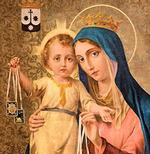The financial scandal now infects the Vatican judicial system
By Phil Lawler ( bio - articles - email ) | Mar 26, 2021
Another month, another Vatican financial scandal.
Technically, I suppose, the latest ugly headlines relate to the same old scandal: the one that erupted in October 2019 when Vatican prosecutors raided the offices of the Secretariat of State, looking for documents related to suspicious real-estate deals. But as the months have passed, and new information about those deals has leaked out, each new revelation has exposed a jaw-dropping level of corruption and deceit.
Everywhere but in Rome, responsible officials have learned that the cover-up only compounds the crime. Unfortunately, while we still know very little about the financial machinations that provoked that astonishing police raid, we now know that Vatican officials have gone to great lengths to conceal the truth.
This week’s headlines come not from the Holy See but from the United Kingdom, where a judge announced that a Vatican request to freeze a suspect’s assets was riddled with “non-disclosures and misrepresentations so appalling” that he lifted the freeze, released the assets—and, rejecting another Vatican request for secrecy, made his ruling very public, in an unmistakable slap at the Vatican’s criminal-justice system.
Ed Condon of Pillar, who has consistently set the journalistic pace in reporting on the Vatican financial hijinks, has an excellent summary of the latest news and what it implies. It’s a complicated story, but to summarize just a few key points:
- The Vatican has charged Gianluigi Torzi with embezzlement of funds—leaving unanswered the question of why the Vatican ever did business with Torzi, who has a record of questionable dealings.
- Torzi has fired back, presenting the British court with documented evidence that the transactions he made were explicitly authorized by leading Vatican officials, including the Secretary of State, Cardinal Pietro Parolin; and his deputy, Archbishop Edgar Pena Parra.
- Cardinal Parolin and Archbishop Pena Parra had explicitly denied authorizing the deals.
- Torzi claimed that Fabrizio Tirabassi, a lay Vatican employee who was apparently suspended last October, boasted about blackmailing senior Vatican officials.
Should we assume that Torzi’s claims are accurate? Certainly not. But signatures on documents do not lie. And by the say, if it is true that Tirabassi was trying to blackmail leading prelates, how did he do so? If senior officials of the Roman Curia are subject to blackmail, isn’t that a story worth pursuing? In any case, at this point, whose claims can we take seriously?
The shadow of suspicion that hangs over the Vatican’s secretive investigation is darkened by the fact that while Torzi faces criminal charges before a Vatican tribunal, Tirabassi—to the best of our knowledge—does not. In January, Vatican prosecutors took another setback when a court in Rome ruled that they had seized property illegally from Tirabassi’s home. Also in January, the Vatican dropped a request for extradition of Cecilia Marogna, a Slovenian woman who was facing charges in the real-estate scandal. The courts outside Vatican City have not been impressed by the Vatican prosecutors’ case.
Just a few weeks ago, in February, Pope Francis issued a motu proprio to update the Vatican’s criminal code, among other things clarifying the rights of defendants. This week’s blistering ruling by British Judge Tony Baumgartner makes it clear that the reform is too little, too late. Reflecting on the Vatican’s plea to keep the matter confidential, the judge remarked that while the Vatican, as a sovereign state, has the right to conduct its own criminal investigations in secrecy, “such a blanket claim does not sit well with the principle of open justice.”
Indeed it does not. For several years now the Vatican has been struggling to overcome the widespread perception that its financial institutions riddled with corruption. The demand for thorough financial reform was by all accounts a major factor in the election of Pope Francis. Pleas for confidentiality and closed-door judicial proceedings do nothing to combat public suspicions. Sunlight, as the saying goes, is a powerful disinfectant. But the Vatican judicial system does not allow for public accountability.
The Vatican actually has taken steps, over the past several years, to introduce greater professionalism and accountability to its financial affairs. International banking regulators have acknowledged that new Vatican rules should guard against money-laundering and other misdeeds. But the regulators have taken pains to observe that while the rules are adequate, the Vatican has still not demonstrated a willingness to enforce those rules by bringing criminal charges against offenders. So the Vatican’s judicial system has come under scrutiny, and prosecutors have been under pressure to win a few convictions.
Was it that pressure that tempted Vatican prosecutors to overstate their case in pursuit of Torzi? Or were the prosecutors themselves left in the dark about the facts of the case? Has the Secretariat of State thwarted effective investigation, and left the prosecutors to rely on the top officials’ claims of innocence? We don’t know. In the absence of transparency—and transparency is most certainly not present here—we left with only a smattering of incomplete evidence, to be augmented by our own suspicions: the sort of suspicions that the Vatican is (we are told) trying to overcome.
All comments are moderated. To lighten our editing burden, only current donors are allowed to Sound Off. If you are a current donor, log in to see the comment form; otherwise please support our work, and Sound Off!








